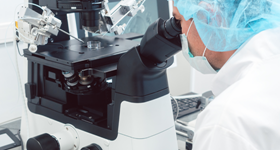Digital Healthcare in Asia

As a life sciences recruitment firm, Real Life Sciences is always looking at the changes that are coming into the healthcare industry and how it affects the talent landscape. The phrase 'Digital Health' is being heard with increasing frequency around the industry, and ranges from the Fitbit on your wrist to personalised medication to artificial intelligence and big data. But what exactly defines digital health?
To explore this space together, we recently organised a panel discussion and networking event "Digital Healthcare in Asia". The attendees included both professionals working within Digital Health in various capacities and industries, as well as senior healthcare commercial professionals who were interested in finding out more about this space.
To share their industry insights on the industry, a panel of industry experts from different industries were selected. Joining us as panellists were:
Shwetank Verma, Head of Open Innovation, LumenLab
Craig De Large, Digital Healcare Strategist, Wiseworking, LLC
Bruno Occhipinti, Strategy & New Business Development Director APAC, Philips Healthcare
Amkidit Afable, Director Go-To-Market Strategies, Johnson & Johnson
Real Life Sciences has gathered what our experts shared based on their experiences and the extensive work both regionally and globally within this article.
What is Digital Health?
Given the term, Digital Health is often used to broadly describe many areas, it would be hard to come up with an all-encompassing definition in a short session. But the general consensus from all the panellists was how Digital Health referred to a convergence of digital and genomic technologies with health, healthcare, living and society. It aims to value add on top of the existing healthcare infrastructure, forming new business models to increase the value for our patients by empowering and enhancing the efficiency of healthcare. Another point that was agreed upon was that this is space that’s being driven by collaboration rather than competition. This is making it crucial for players that never collaborated before, to now come together, and work towards delivering a better quality of care to the end patient.
Why now – What are the catalysts within the Digital Healthcare that are coming up in a big way?
As Bruno Occhipinti had mentioned, "Mobile phones are increasingly available in countries including Indonesia where doctors can be equipped with an app to run tests that can detect pregnant mothers at risk for example."
The idea, as he and Shwetank Verma explained further, is that we now live in a time where there are technologies available that have achieved sufficient levels of market penetration (and affordability) into markets. These can now be used as viable means of delivering healthcare in ways that were never possible before. In addition to the access piece, technologies as they exist today, allow for better patient engagement. One such example would be the use of treatment management apps which can be useful for reducing medication non-adherence and nutrition apps which can drive outcomes’ measures for diabetic patients.
Besides the means available for this convergence to happen, another crucial catalyst is the current state of healthcare industry. As many of the developed markets struggle with aging populations, increased healthcare government spend, and increased stress on hospitals, there is an urgent need to look into increased operational efficiencies. This will aim to reduce the number of patients flowing into hospitals whilst ensuring that they receive the best possible care in the shortest possible time within the hospital environment following a transition to home care. Hence, Digital Healthcare might just hold the key to addressing these needs, making it a hot area.
The panel concluded that there are distinct objectives in terms of what Digital Health is trying to achieve in the different markets. For developed markets, the main objective revolves around improving operational efficiencies across the entire healthcare infrastructure. However, in developing markets, the objectives are skewed towards increasing access to healthcare for groups of patients that didn’t have this access earlier.
Changing Industry – Evolving with it
While Digital Health is the talk of the street, real change might be slower in terms of implementation. Regardless, the fact remains that as the industry changes, the hottest skill sets in the industry would too, change. The panel discussed what some of these might be and the unanimous opinion was that a siloed understanding of the healthcare industry would not be enough moving forward. A familiarity with the capabilities of software, technology, AI, Big Data etc. is going to be a must. This does not go to say that everyone should rush into the learning of coding, big data analytics, networking etc through lessons for example, but a professional would need to have an appreciation of what these technologies bring to the table and how they could tie in with the healthcare ecosystem.
A particular set of skills that will grow in demand would be business development. While these roles might be filled within various capacities at the moment, the panel concluded that a business development professional would need to have the capacity to deal with a broader spectrum of partners. This includes Multi-National Corporations (healthcare as well as non-healthcare), governments, non-governmental organizations, industry associations etc. The industry would need this person to be the bridge that would bring these partners together.
In addition to the change that’s coming in the skill sets required, it will also lead to a change in the pace of working which would in turn, requires a change in mindset. This change is described as the "Designer Maker Mindset" according to Mr Craig Delarge of WiseWorks LLC. With advancements in technology, increased players and industries coming into the fold, the environment is going to require more agile and faster paced decision making. As a way of getting into this mind-set, Craig suggested participating in hackathons, where one is required to come up with solutions to a particular problem whilst working with a team of strangers, in a high pressure and time constrained environment.
Shwetank offered a simple piece of advice on this by suggesting an arrangement of monthly conversations with different people who are in industries such as start-ups, incubators, as well as other professionals who are working within the space. This will, at the very least, keep you abreast with what some of the new technologies and solutions that are entering the industry, and might just lead to further areas of collaboration.
If you are interested in attending such panel discussions or future networking sessions, please contact Samarth Goel at s.goel@realstaffing.com or follow our LinkedIn page for more industry updates.




